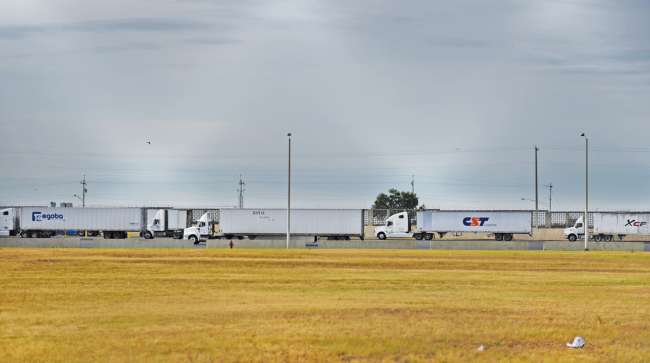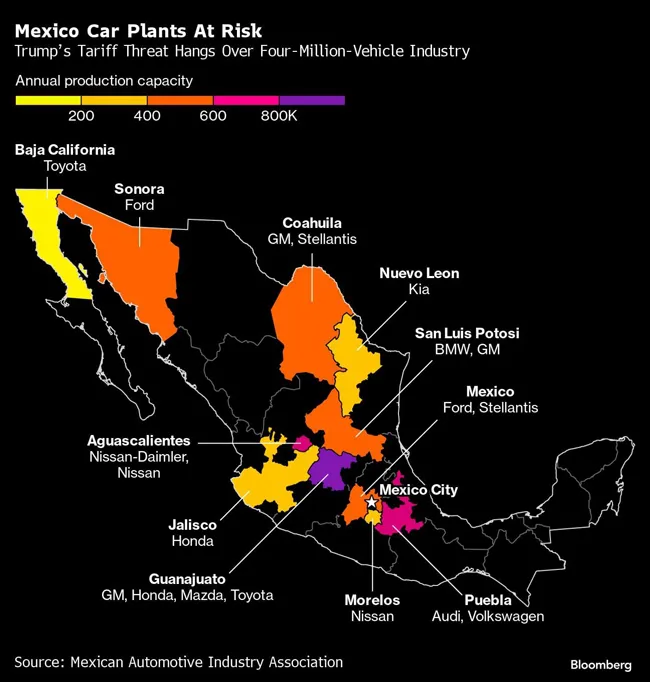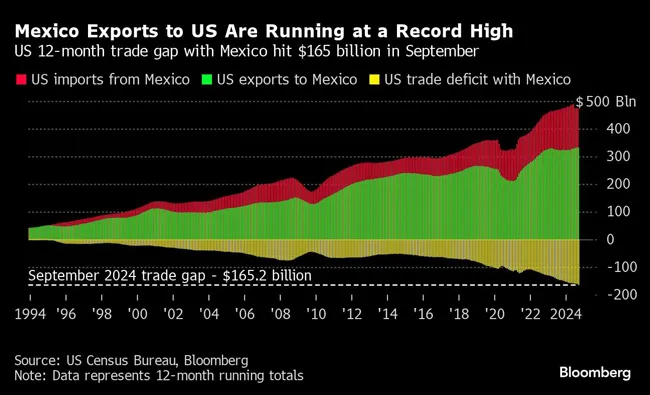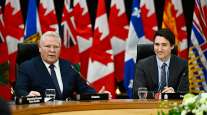Bloomberg News
Mexico Warns Against ‘Inflationary’ US Tariff Plan

[Stay on top of transportation news: Get TTNews in your inbox.]
Donald Trump’s threat of 25% tariffs on Mexico and Canada would cost the U.S. economy as many as 400,000 jobs and increase prices for American consumers, according to the Mexican government.
Economy Minister Marcelo Ebrard laid out the warning to the U.S. president-elect on Nov. 27 during a press conference alongside President Claudia Sheinbaum. A veteran of confrontational North American trade talks during Trump’s first administration, he gave a presentation on how a new round of levies would affect the Mexico-U.S. relationship.
Ebrard said the new tariffs would mainly hit U.S. automotive companies active in Mexico including General Motors Co. and Ford Motor Co., which produce 88% of the pickup trucks sold in the U.S. “Our estimate is that the average price of these vehicles will increase by $3,000 per unit,” he noted.
Mexico is stepping up its defense against Trump’s new tariff threats, rallying a group of national businesspeople at Sheinbaum’s daily press briefing. Officials said the government also plans to advance its trade agreement with the European Union and improve its commercial ties with Brazil.

(Bloomberg News)
On Nov. 26, Sheinbaum suggested Mexico could respond to the threat with levies of its own, warning the economic consequences would be dire. “One tariff will be followed by another in response, and so on until we put common companies at risk,” the president said in her first response to Trump’s threats.
By the Nov. 27 morning presser, Sheinbaum said her government is in the process of working out the details for its own retaliatory tariffs. “We have to go step by step and have different scenarios,” she said. “We should have a short and long-term plan.”
The Mexican peso weakened as much as 0.6% to 20.78 per U.S. dollar, extending its weekly decline. To Thierry Wizman, a global foreign-exchange and rates strategist at Macquarie Group Ltd., there’s room for additional losses and the currency could trade near 21.75 at the end of the next year.
“We doubt that ‘Day 1’ tariffs will be actually imposed on Mexico or Canada,” Wizman wrote in a note Nov. 27. “But concessions to be made by Mexico won’t be favorable for its external accounts.”
Still, Sheinbaum said that even with Trump’s latest rhetoric, she doesn’t expect the U.S. to curb its role in the Mexican economy. She also said Mexico has a good relationship with China even as it seeks to reduce imports from that country.

(Bloomberg News)
Mexican businesswoman Gina Diez Barroso, who was one of more than a dozen corporate leaders to join Sheinbaum and Ebrard on stage, said during the press conference that the U.S. doesn’t want a trade dispute with Mexico.
“This policy of President Trump, which we don’t know if it is a policy or a threat, because we already know how he acts many times, is a 100% inflationary policy for his country,” she said. “I am with President Sheinbaum 100%, this is a matter of dialogue between the three countries, we are the most important partner of the U.S.”
The U.S. president-elect is vowing to implement tariffs on imports from Canada and Mexico until fentanyl and undocumented migrants stop flowing over U.S. borders.
John Elliott of Load One demonstrates how onboard video combined with AI-enabled analytics can transform fleet safety. Tune in above or by going to RoadSigns.ttnews.com.
Sheinbaum said her administration plans to ensure that Trump’s team is aware of the progress it has made on stemming irregular crossings, and is working on an “integral” migration policy. Mexico is also preparing a report on the impact that eventual deportations from the U.S. could have.
Canada, meanwhile, has said it has a plan to boost border security — and points to U.S. government data that shows most of the problems come from Mexico.
Sheinbaum said Canada also needs Mexico and that she is confident the northern nation will remain in the North American trade agreement that will be reviewed in 2026. She also said her government is in touch with Trump’s transition team.
Mexico has become the U.S.’s largest trading partner, with the Mexican government estimating there’s now $800 billion annually in total trade between the neighboring countries.
Ebrard underlined the importance of improving the trade relationship between the U.S., Mexico and Canada, saying it stood at $1.8 trillion between January and September, and generates 30% of the world’s GDP.
“If tariffs are imposed and we enter into a process of raising tariffs, who is going to be affected? All three countries,” Sheinbaum said. “We do not compete with each other, we complement each other.”
Want more news? Listen to today's daily briefing below or go here for more info:





